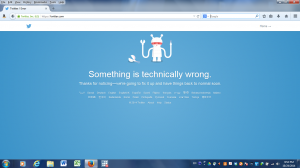Well, better later than never: while my personal compass for the course has been originated some time ago and it is now time to refine it, I think it’s good to insert the original thinking here, so we see where the (refined) thoughts are coming from.
Ladies and gentlemen, I thank you in advance for being kind to a budding blogger.
* * *
So, the original compass for the course (September 19, 2014).
When I read the description for the Massive in the online catalogue, I was very intrigued. I researched the teaching instructor’s (Justin Reich’s) work and became very energized about the course.
So, here I am. With my perceptions and believes, totally ready to learn and transform my own thinking.
Being relatively new to many of the Course’s components (the social media part, the dispersed course materials) my expectations of myself are multi-dimensional.
Firstly, I have little trust in social media with a hint of fear of its trajectory of collecting and storing data (ironically, I am blogging about it via social media – well, it’s part of the course requirement). Participating in the social media is indeed tempting, while there is quid pro quo. Se la vie. On the other hand, being part of the social network is less and less avoidable. In this regard, my compass would be crafting a constructive digital presence with potential of contributing to our shared learning, navigating effectively the features available today.
Secondly, I realized how much I love structure and order, while being part of this course. As I am learning, the content for a MOOC and a course about MOOCs is much dispersed. And my compass here is to reach a comfortable level of order and chaos. While “chaos is a new reality” (G. Siemens, 2004 “Connectivism: A learning Theory for the Digital Age”), this reality is struggling to find a proper place in my striving-to-be-orderly-world. I am truly hoping to have this challenging part sorted out by the end of the course.
Most importantly, despite mentioning it last, my contribution to the real-life project or, as our instructor puts it (citing loosely) “making things around us a little bit better” is the key compass point I will be striving to reach. While some of my peers came to this class with very specific project, already knowing how they are going to make the world a little bit better, I came with a desire to learn and to be exposed to what is out there. I am intrigued with my own outcome, which is yet to be seen. I guess, I am intrigued to learn about myself as much as I am intrigued about the work I will be doing.
